A consortium of researchers from Makerere University‘s College of Veterinary Medicine, Animal Resources, and Biosecurity (COVAB) and the Uganda Virus Research Institute (UVRI), with support from CRDF Global have piloted a cyberbiosecurity project to address the growing threat of cyberattacks on laboratories handling high-risk biological materials.
As per the International Federation of Biosafety Associations (IFBA), CyberBiosecurity is the “safeguarding and mitigation of misuse, exploitation, damage to or disruption of valuable information, data, databases, equipment, and facilities at the interface of the biological laboratory, related life sciences facilities, and digital worlds.” The project, titled “Establishment of Cyber Biosecurity Inventory and Procedures for Effective Safety and Administrative Controls for COVAB and UVRI Laboratories in Uganda,” is led by Associate Professor Lawrence Mugisha from COVAB, Makerere University, and Dr. Stephen Balinandi from UVRI.
While hosting the workshop on August 16, 2024 at the Centre for Biosecurity and Global Health, Makerere University , Professor Mugisha in a special way welcomed the participants to the workshop. He noted that; Cyber threats and attacks have become a serious threat to many establishments including (government institutions, business enterprises and other critical facilities like financial and health facilities) across the global disrupting services and causing serious financial losses in addition to individual and institutional safety.
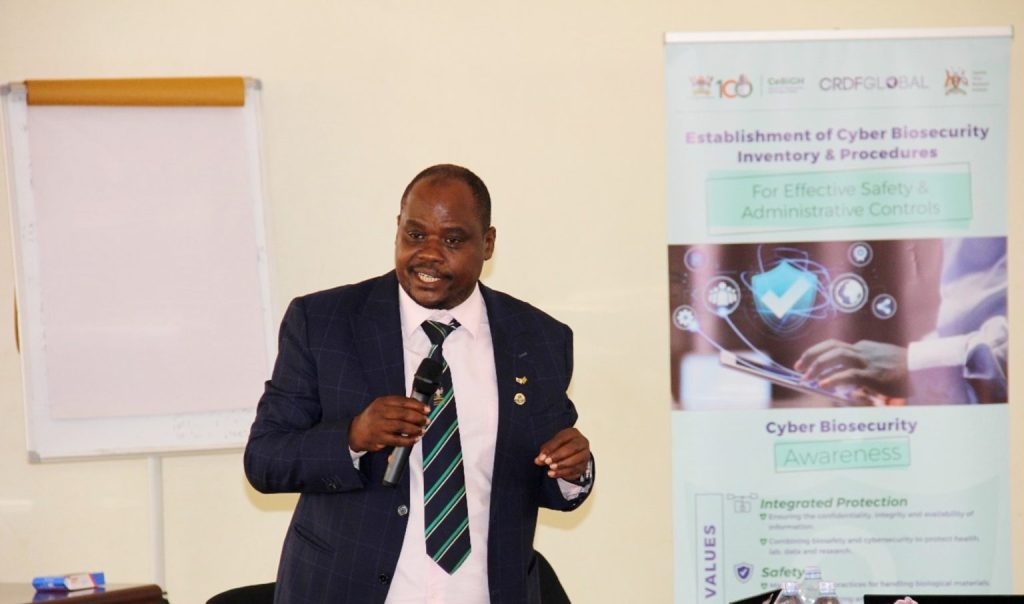
‘’ More recently these attacks have extended and targeted laboratories handling biological materials including high risk and highly pathogenic organisms like anthrax, ebola, SARS-CoV2 viruses with potential for bioterrorism.
To contribute to data driven interventions aimed at securing and protecting laboratory facilities handling high consequence/risk pathogens from cyber-attacks and the need for cyberbiosecurity, Makerere University led by College of Veterinary Medicine, Animal Resources and Biosecurity (CoVAB) in collaboration with Uganda Virus Research Institute (UVRI) is implementing the first pilot project in Uganda on Cyberbiosecurity.
This collaborative project is aimed at mapping and identifying potential cybersecurity threats to the biological laboratories at Makerere University and UVRI by conducting a thorough information and communication Technology (ICT) risk assessments. The project will then develop comprehensive Cybersecurity Standard Operating Procedures, guidelines and manuals with a goal of establishing Cyberbiosecurity Policy. Furthermore, the project is aimed at creating awareness about cyber threats, cyber biosecurity, biosafety and biosecurity among staff, scientists/researchers and management at the two institutions to promote Cyber security best practices’’ explained Prof. Mugisha
In his opening remarks, CoVAB Principal Prof. Frank Norbert Mwiine emphasized the reality of cyberbiosecurity threats, sharing that he himself has been a victim of a cybersecurity breach involving his atm. He urged the team to consider developing training projects focused on cyberbiosecurity and to build a strong cybersecurity research team within CoVAB and UVRI. Prof. Mwiine also called on the team to actively seek research opportunities around cyberbiosecurity adding that CoVAB is open to collaborations.
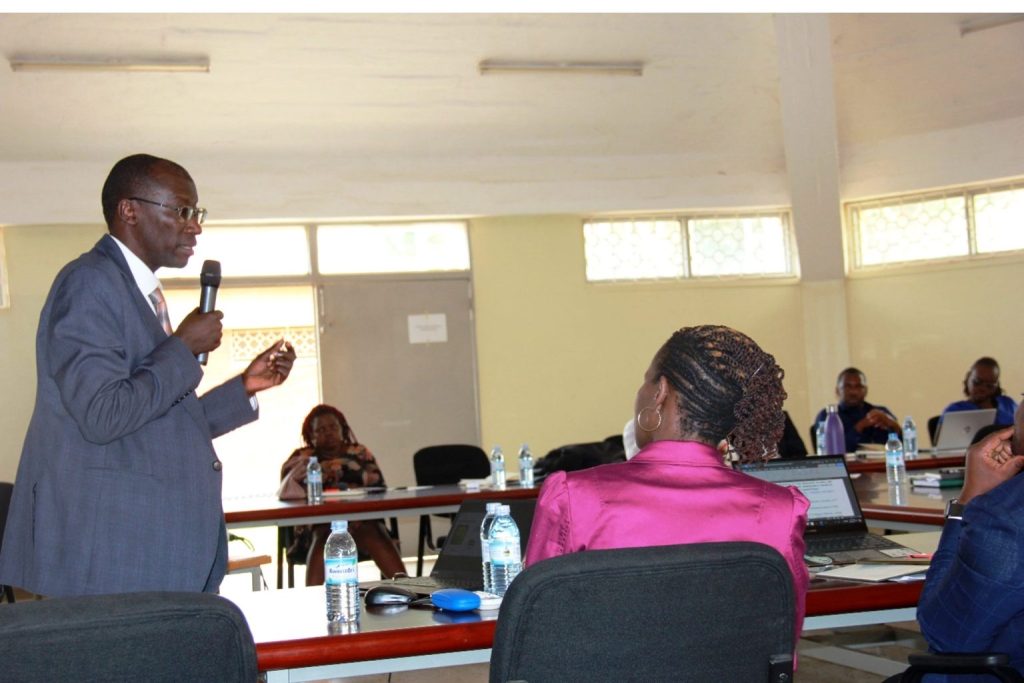
Furthermore, Prof. Mwiine expressed his gratitude to Prof. Mugisha for his tireless efforts in coordination and leading activities and projects advancing ethics, bioethics and biosafety in Uganda, noting that Prof. Mugisha played a key role in establishing Institutional Animal Care and Use Committee (IACUC) and Institutional Biosafety Committee (IBC) at Makerere University. Prof. Mwiine also reiterated Makerere University’s commitment to cyberbiosecurity and biosecurity, highlighting the ongoing research collaboration between CoVAB and UVRI.
In her presentation centered around Dual-Use Research of Concern (DURC), Sandra Matinyi, Co-founder and Executive Director of Nuo Bioscience, shared critical insights on the global guidance framework for the responsible use of life sciences. This framework, published by the World Health Organization (WHO) in 2022, focuses on mitigating biorisks and governing dual-use

By Joseph Odoi
A consortium of researchers from Makerere University‘s College of Veterinary Medicine, Animal Resources, and Biosecurity (COVAB) and the Uganda Virus Research Institute (UVRI), with support from CRDF Global have piloted a cyberbiosecurity project to address the growing threat of cyberattacks on laboratories handling high-risk biological materials.
As per the International Federation of Biosafety Associations (IFBA), CyberBiosecurity is the “safeguarding and mitigation of misuse, exploitation, damage to or disruption of valuable information, data, databases, equipment, and facilities at the interface of the biological laboratory, related life sciences facilities, and digital worlds.”
The project, titled “Establishment of Cyber Biosecurity Inventory and Procedures for Effective Safety and Administrative Controls for COVAB and UVRI Laboratories in Uganda,” is led by Associate Professor Lawrence Mugisha from COVAB, Makerere University, and Dr. Stephen Balinandi from UVRI.
While hosting the workshop on August 16, 2024 at the Centre for Biosecurity and Global Health, Makerere University , Professor Mugisha in a special way welcomed the participants to the workshop. He noted that; Cyber threats and attacks have become a serious threat to many establishments including (government institutions, business enterprises and other critical facilities like financial and health facilities) across the global disrupting services and causing serious financial losses in addition to individual and institutional safety.
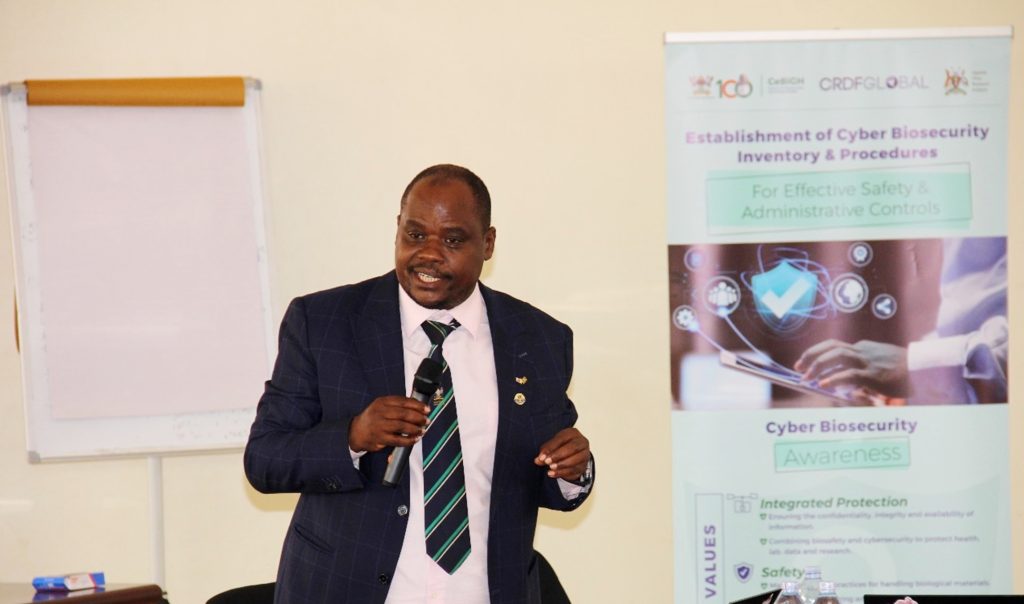
‘’ More recently these attacks have extended and targeted laboratories handling biological materials including high risk and highly pathogenic organisms like anthrax, ebola, SARS-CoV2 viruses with potential for bioterrorism.
To contribute to data driven interventions aimed at securing and protecting laboratory facilities handling high consequence/risk pathogens from cyber-attacks and the need for cyberbiosecurity, Makerere University led by College of Veterinary Medicine, Animal Resources and Biosecurity (CoVAB) in collaboration with Uganda Virus Research Institute (UVRI) is implementing the first pilot project in Uganda on Cyberbiosecurity.
This collaborative project is aimed at mapping and identifying potential cybersecurity threats to the biological laboratories at Makerere University and UVRI by conducting a thorough information and communication Technology (ICT) risk assessments. The project will then develop comprehensive Cybersecurity Standard Operating Procedures, guidelines and manuals with a goal of establishing Cyberbiosecurity Policy. Furthermore, the project is aimed at creating awareness about cyber threats, cyber biosecurity, biosafety and biosecurity among staff, scientists/researchers and management at the two institutions to promote Cyber security best practices’’ explained Prof. Mugisha
In his opening remarks, CoVAB Principal Prof. Frank Norbert Mwiine emphasized the reality of cyberbiosecurity threats, sharing that he himself has been a victim of a cybersecurity breach involving his atm. He urged the team to consider developing training projects focused on cyberbiosecurity and to build a strong cybersecurity research team within CoVAB and UVRI. Prof. Mwiine also called on the team to actively seek research opportunities around cyberbiosecurity adding that CoVAB is open to collaborations.
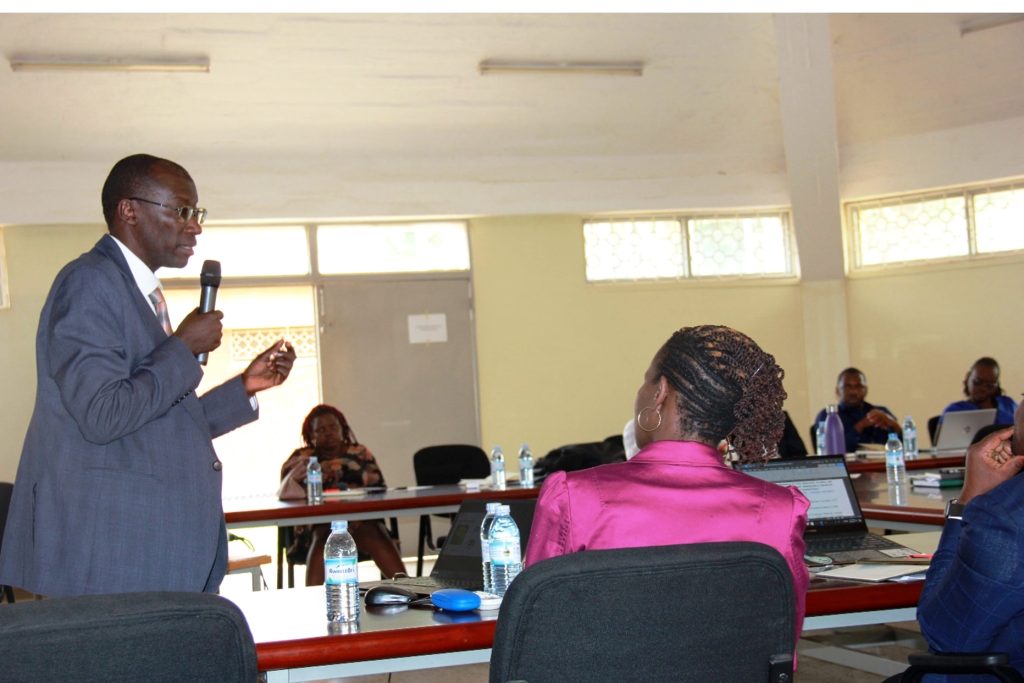
Furthermore, Prof. Mwiine expressed his gratitude to Prof. Mugisha for his tireless efforts in coordination and leading activities and projects advancing ethics, bioethics and biosafety in Uganda, noting that Prof. Mugisha played a key role in establishing Institutional Animal Care and Use Committee (IACUC) and Institutional Biosafety Committee (IBC) at Makerere University. Prof. Mwiine also reiterated Makerere University’s commitment to cyberbiosecurity and biosecurity, highlighting the ongoing research collaboration between CoVAB and UVRI.
In her presentation centered around Dual-Use Research of Concern (DURC), Sandra Matinyi, Co-founder and Executive Director of Nuo Bioscience, shared critical insights on the global guidance framework for the responsible use of life sciences. This framework, published by the World Health Organization (WHO) in 2022, focuses on mitigating biorisks and governing dual-use research.
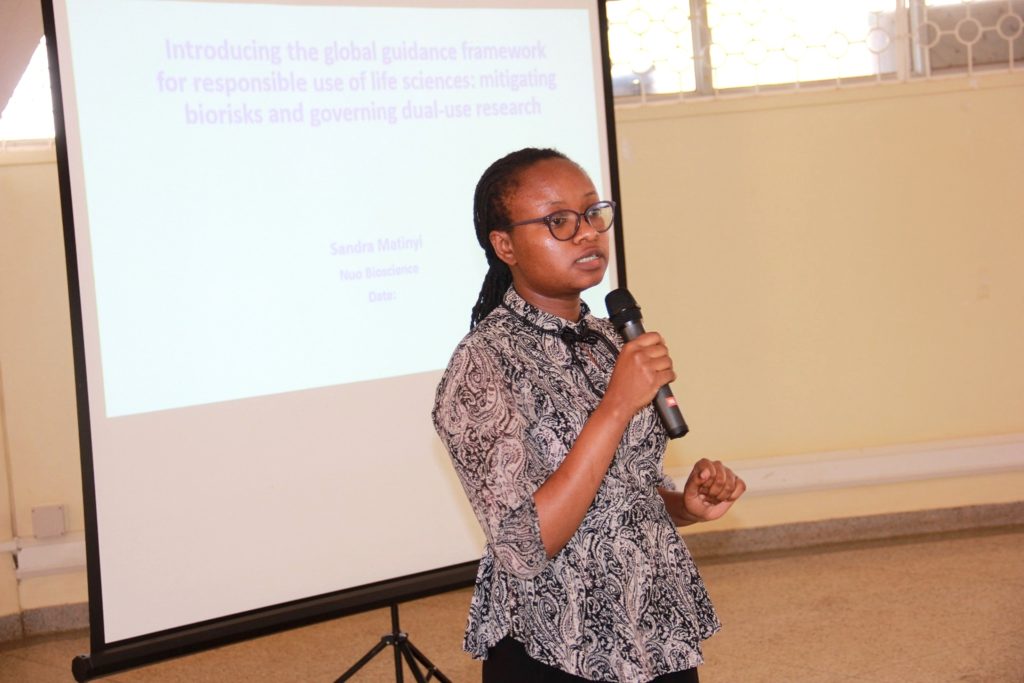
‘’With the emergence of new technologies and rapid advancements in life sciences research, there was previously no global guidance for identifying or mitigating risks related to dual-use research of concern until the WHO introduced this framework in 2022.’’
She noted that Uganda, while still lacking a specific policy on DURC, is among the first countries to pilot the introduction of the WHO framework. This positions Uganda at the forefront of adopting international standards for biosecurity, which is essential given the global nature of these concerns.
“As a country, Uganda has not yet developed a specific policy, but we are among the first to pilot the introduction of this framework.
‘’Mitigating biorisks and governing dual use research is a global issue as we live in a global village. Its a shared responsibility and everyone has a role to play including scientists, researchers, the public among others. The framework is based on a one health approach and it does not assume a one fits it all approach. We ought to customize framework to the Ugandan context.’’” added.
In her presentation, Dr. Monica Namayanja highlighted the critical importance of establishing a Bio-Risk Management Committee, the role of dedicated biosafety officers, and the need for specialized laboratory managers. She emphasized that the involvement of top management is crucial for effective bio-risk management, noting that continuous improvement in this area is essential for maintaining best practices.
During the workshop, participants and project team shared lessons and facility based best practices desired for cybersecurity focusing on pertinent aspects of safeguarding digital and biological infrastructures.
The presentations also explored emerging topics in biosecurity including Dual Research (DUR), Dual Research of Concern (DURC) and Know Your Collaborator |(KYC)
The project, which started in April 2024 and is set to conclude in September 2024, was made possible with support from CRDF Global (Strengthening Individuals | Building Relationships | Improving Our World).


